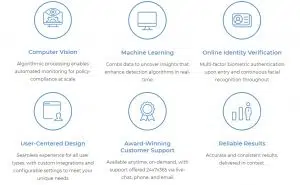
With midterm season kicking off, students at Western University are speaking out against a new cyber-proctor tool. Protortrack, a third party platform used to monitor students taking tests at home, has some students raising red flags about privacy.
This comes after Proctortrack suffered a data breach on Oct. 13. Western has not yet provided any comment on the breach.
Western, under the approval of eCampus Ontario, struck a deal to implement the software in Sept. in light of COVID-19. The online proctor allows students to write exams off-campus, while “ensuring that academic integrity is maintained,” according to Western.
The software uses automation and AI as well as Zoom video conferencing to monitor students while they take tests at home. It uses screen sharing technology to monitor students’ computer activity, films students while they take their tests, and scans biometric data from students’ knuckles. All this, while an automated video review flags any suspicious activity.
Under the Proctortrack privacy policy, the U.S. run organization may also collect the following information from students:
- Name
- Photograph of an identity document, such as a driver’s license
- Photograph of you
- Telephone Number – (used for tech support only)
- Audio and video recordings of you taking tests
- Room scan- scan of the test-room environment
- Biometric data: Face and optionally, Knuckle voice scan, which may be considered as biometric information under certain regulatory regimes
- Hardware and software details (background process list, system configuration information, etc)
Proctortrack updated their privacy policy on Sept. 15, 2020. The system also collects the name of your school, test submissions, email addresses, and screen captures. Proctortrack may store data for 180 days, while holding identity information for up to a year.
Although Proctortrack’s privacy policy states that they don’t sell or share information with anyone other than the school, students are still concerned that their data could be accessed by United States law enforcement under the Patriot Act, if stored on a U.S. server.
Corey Vercauteren is a third year computer science student at Western. He created an online petition calling on Western President Alan Shepard to stop the use of Proctortrack. It’s received 9,197 signatures in three weeks, with a goal of 10,000.
“Given the department and what I’m studying, I’m a little more savvy in terms of knowing what these programs can do, and what similarities they have to spyware,” said Vercauteren.
He said he tried reaching out directly to department heads at first, creating the petition when conversations saw no results.
“I wasn’t surprised by the support that I had gotten,” he said. “But more so how rapidly it grew.”
Vercauteren added that he is worried about why Proctortrack is storing students’ information.
“It’s extremely invasive to students’ privacy, and especially when we’re being forced to use it and don’t have a choice.”
Salma Hussein is a second year nursing student, taking classes at both Western University and Fanshawe College. She shared Vercauteren’s sentiments.
“I know in a typical exam setting, your professor would be watching you,” said Hussein. “But it’s that difference of setting, you’re in your own home, in your own space. A lot of students, including me, are just very curious as to how this program works and how much of our privacy is being breached.”
Both Hussein and Vercauteren expressed concern with the fact that the software is downloaded to their computers, allowing access to their personal devices. Western maintains that the software cannot access personal files.
On the petition’s webpage, Vercauteren expressed that the software poses additional concerns for students dealing with neurodivergence such as autism or ADHD. He argues that “the freedom to get up and move around and take breaks from the test is paramount to success.”
Facial recognition technology is also notorious for not accurately determining the facial features of people with darker skin tones. Vercauteren states on the petition webpage that that means students of colour may not be fairly evaluated by the software.
Western has not responded directly to the petition, but has stated that Proctortrack passed their rigorous vetting process for third-party service providers. According to the university, analysis determined that the software had “robust data security and privacy practices.”
However, under the university’s privacy considerations for online proctoring, Western stated, “Unfortunately, no data transmission over the Internet can be guaranteed to be 100 percent secure. As a result, while we are committed to protecting your personal information, we cannot ensure or warrant the security of any information provided to Proctortrack.”
For now, Vercauteren is calling on students to sign the petition and express their opposition to Proctortrack to their professors and department heads. He’s also calling on faculty members to back out of using the software and demanding the university cancel all plans to use Proctortrack for exams.
“I think Western is putting integrity first, over the privacy concerns,” said Vercauteren.

















Comments